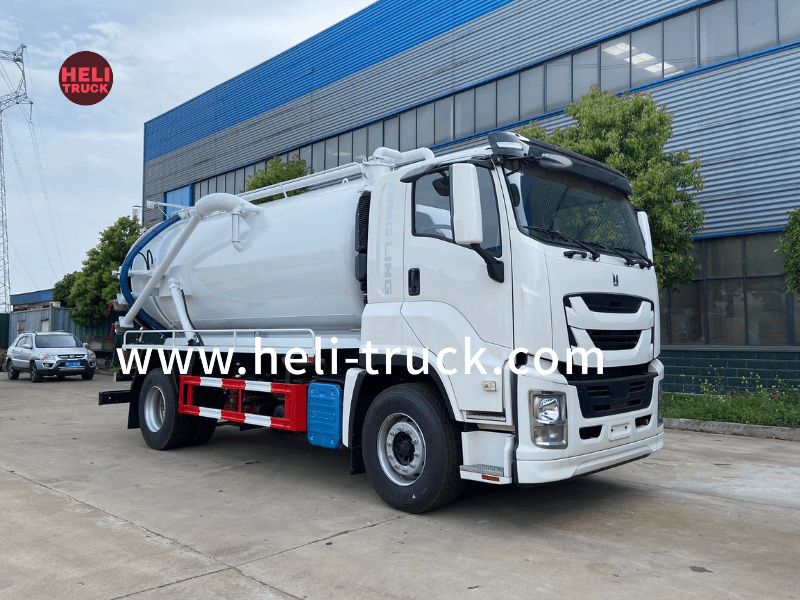Introduction:
Public parks are essential spaces in urban areas that provide a variety of benefits to communities, including recreation, relaxation, and environmental preservation. However, managing waste generated in these parks can be a significant challenge. work truck may not be efficient or practical in these settings due to the large volumes of waste generated daily. Garbage compactor trucks offer a sustainable and effective solution for managing waste in public parks. This article explores the importance of garbage compactor trucks in enhancing waste management practices in public parks and their benefits in maintaining clean and sustainable park environments.
1. Understanding Garbage Compactor Trucks
Garbage compactor trucks, also known as compactors or trash compactors, are specialized vehicles designed to collect and compact waste efficiently. These trucks are equipped with a compaction mechanism that compresses waste materials, reducing their volume and making them easier to transport and dispose of. Garbage compactor trucks come in various sizes and configurations to suit different waste management needs, from small-scale operations in residential areas to large-scale collection in commercial and industrial settings.
2. Benefits of Using Garbage Compactor Trucks in Public Parks
2.1 Efficient Waste Collection: Garbage compactor trucks are designed to handle large volumes of waste, making them ideal for collecting trash from public parks where waste generation can be high, especially during peak hours or special events. The compaction mechanism allows the trucks to collect more waste in fewer trips, reducing the frequency of collections and lowering operational costs.

2.2 Improved Hygiene and Sanitation: Efficient waste collection with garbage compactor trucks helps maintain cleanliness and hygiene in public parks. By compacting waste on-site, the risk of littering, pest infestations, and foul odors is minimized, creating a more pleasant and sanitary environment for park visitors and staff.
2.3 Environmental Sustainability: Garbage compactor trucks play a crucial role in promoting environmental sustainability by reducing the volume of waste sent to landfills. The compaction process not only saves space but also reduces the carbon footprint associated with waste transportation and disposal. By compacting waste efficiently, parks can minimize their environmental impact and contribute to a cleaner and greener community.
2.4 Cost-Effective Waste Management: While the initial investment in garbage compactor trucks may be higher than conventional waste collection methods, the long-term cost savings are significant. By optimizing waste collection and transportation, parks can reduce labor costs, fuel consumption, and maintenance expenses associated with waste management operations. Garbage compactor trucks offer a cost-effective solution for managing waste in public parks, ensuring efficient resource utilization and budget allocation.
3. Best Practices for Implementing Garbage Compactor Trucks in Public Parks
3.1 Tailored Waste Management Plans: Before deploying garbage compactor trucks in public parks, it is essential to develop a comprehensive waste management plan that considers the park's specific needs and waste generation patterns. Tailoring the collection schedules, routes, and disposal methods to the park's requirements can maximize the efficiency and effectiveness of garbage compactor trucks in managing waste.
3.2 Staff Training and Maintenance: Proper training of park staff and operators is critical for the safe and effective use of garbage compactor trucks. Staff should be trained in operating the equipment, handling waste materials, and maintaining the trucks to ensure optimal performance and longevity. Regular maintenance checks and servicing are essential to prevent breakdowns and extend the lifespan of the vehicles.
3.3 Public Awareness and Participation: Engaging park visitors and local communities in waste management initiatives is key to the success of garbage compactor truck programs in public parks. Educating the public about proper waste disposal practices, recycling options, and the benefits of using compactor trucks can help promote a culture of environmental responsibility and sustainability. Encouraging public participation through waste segregation, recycling programs, and clean-up events can further enhance the effectiveness of garbage compactor trucks in maintaining clean and healthy park environments.
4. Case Studies and Success Stories
4.1 Central Park, New York City: Central Park, one of the most iconic public parks in the world, has implemented garbage compactor trucks to streamline waste management operations. By using compactors for waste collection and recycling, Central Park has significantly reduced its environmental impact and operational costs while maintaining a clean and sustainable park environment for millions of visitors each year.
4.2 Hyde Park, London: Hyde Park, a historic royal park in London, has adopted garbage compactor trucks as part of its waste management strategy. The park's compactor truck program has helped minimize littering, improve sanitation, and enhance recycling efforts, contributing to a more eco-friendly and efficient waste management system in the heart of the city.
5. Future Trends and Innovations in Garbage Compactor Trucks
5.1 Smart Waste Management Systems: The integration of smart technology and data analytics into garbage compactor trucks is revolutionizing waste management practices in public parks. Smart waste management systems enable real-time monitoring of waste collection, compaction levels, and vehicle tracking, allowing for optimized route planning, resource allocation, and performance evaluation. These innovations enhance operational efficiency, reduce environmental impact, and improve overall waste management outcomes in public parks.
5.2 Sustainable Materials and Design: The development of sustainable materials and design features for garbage compactor trucks is a growing trend in the waste management industry. Eco-friendly materials, energy-efficient components, and recyclable parts are being incorporated into compactors to minimize environmental impact and enhance sustainability. By embracing green technologies and practices, garbage compactor trucks can further contribute to a circular economy and reduce their carbon footprint.
Conclusion:
Garbage compactor trucks play a vital role in enhancing waste management practices in public parks by improving efficiency, hygiene, sustainability, and cost-effectiveness. By adopting best practices, engaging stakeholders, and leveraging innovative technologies, parks can maximize the benefits of garbage compactor trucks in maintaining clean and sustainable environments for visitors and residents alike. As the demand for effective waste solutions continues to grow, garbage compactor trucks are poised to play a central role in shaping the future of waste management in public parks around the world.
